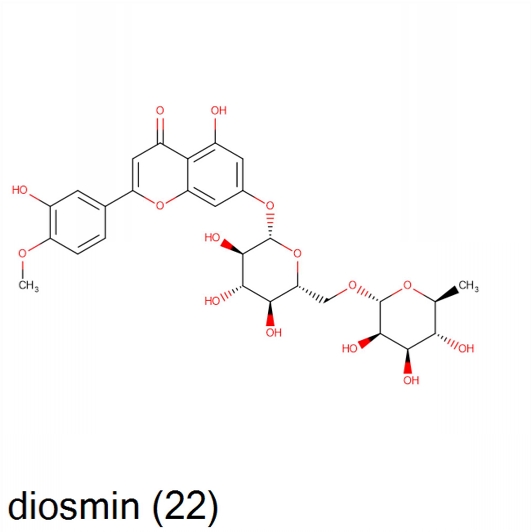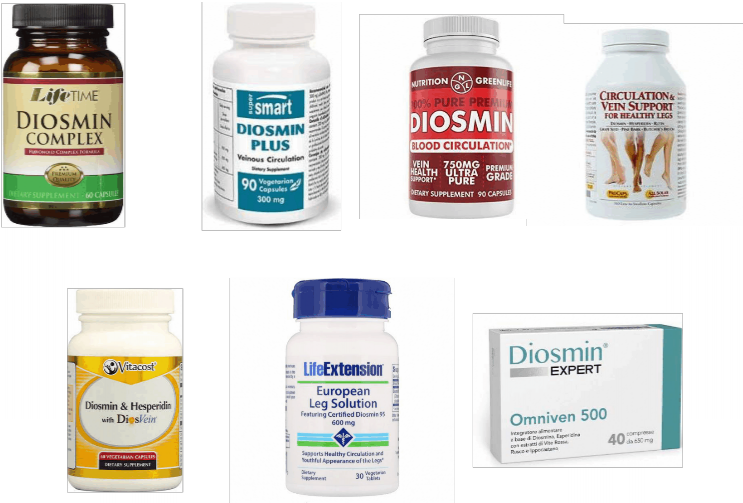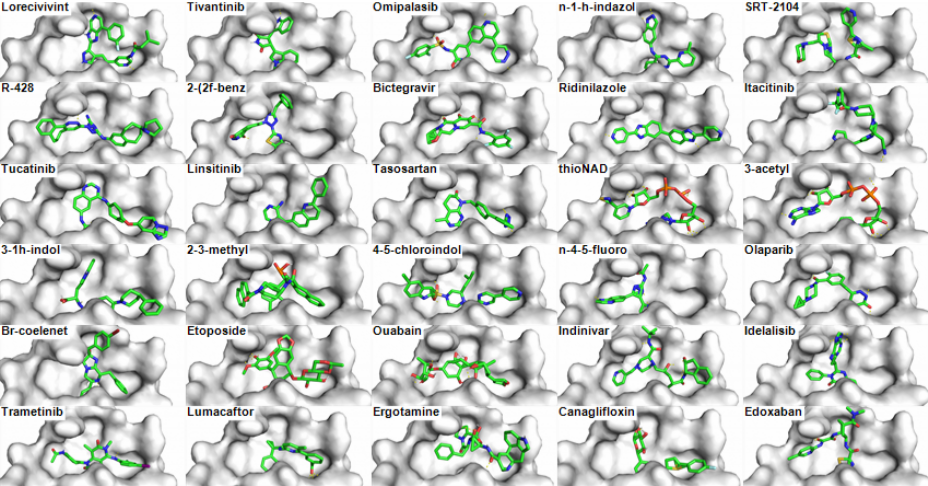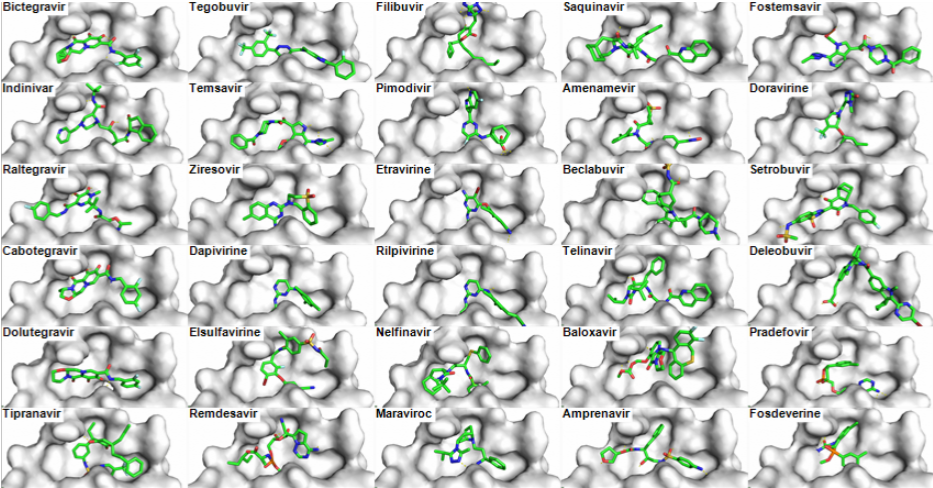Examples of prescription-free diosmin supplements available online or at nutrition stores.
NXG Logic Study Finds that Natural Supplement Diosmin For Varicose Veins May Treat COVID-19 Disease Better than 97% of Antiviral Drugs
A computational study of 4,600 drugs indicates that approved drugs were less effective than non-approved drugs when binding to a COVID-19 protein. In addition, Diosmin, a non-prescription natural supplement bound better than 99% of drugs considered.
HOUSTON, TX, USA, April 20, 2020 - A researcher at NXG Logic, LLC (www.nxglogic.com) recently completed a molecular dynamics study of 4,600 drugs to identify which ones could potentially be repurposed to treat COVID-19 disease. The findings are described in a paper titled "In Silico Molecular Dynamics Docking of Drugs to the Inhibitory Active Site of SARS-CoV-2 Protease and Their Predicted Toxicology and ADME," which provides a full description of the computational approach pursued [1].
COVID-19 disease is caused by the newer form of the earlier 2003 SARS-CoV virus, called SARS-CoV-2. Both variants of the virus are zoonotic, meaning they originated from animal sources. The investigator, Dr. Leif Peterson, said that "because of mutations in the newer SARS-CoV-2 virus, almost everything must be re-studied, including the search for new drugs and vaccines." If the mutations observed in the virus don't seem to change that much as it moves across the globe - it will lead to consistency, meaning that drugs and vaccines may work for a wider patient population.
"While existing drugs, such as antivirals, may be effective for treating the earlier SARS disease, it doesn't mean they will be as effective against COVID-19 disease." Peterson said. "The newer form of the virus is very similar to the earlier SARS-CoV, however, the newer mutations could mean that other non-tested drugs may work better."
The goal was to find drugs that stick like glue in a special "pocket," or active site, on the surface of a protein called 3CLpro, which COVID-19 uses to create numerous copies of itself inside infected cells of a patient. The 3CLpro protein is one of many proteins generated inside infected cells, and acts like a scissors to cleave larger proteins into smaller proteins used for constructing new copies of the virus, which then leave the cell to infect other cells. Therefore, researchers are trying to identify drugs that bind to this specific pocket to thwart replication of the virus, so that patient treatment can be improved. The computer analysis required several days of high-performance computing on Amazon's AWS cloud computing fleet.
Overall, the results indicate that FDA-approved drugs were much less successful in binding to the active site of 3CLpro when compared with investigational and experimental drugs, which are not FDA-approved. The top 5 investigational drugs were Lorecivivint, Tivantinib, Omipalisib, Bictegravir, and Ridinilazole, while the top 5 FDA-approved drugs were Olaparib, Etoposide, Ouabain, Indinavir, and Idelalisib. Bictegravir and Indinavir are both antiviral drugs used for HIV-1 treatment.
Another observation was that the natural citrus-derived flavonoid Diosmin, which is used without prescription as a self-medicating supplement for varicose veins, ranked 22 overall and showed impressive results in terms of its binding strength at the active site. Dr. Peterson said that "before drugs are used for docking into a pocket of a protein, their energy is minimized to a relaxed state, which represents their natural 3-dimensional form as they float around in water inside a cell." In its energy-minimized state, Diosmin was able to deeply penetrate and fully cover the width of the active site's pocket better than 99% of the drugs studied. Better yet, it formed 9 hydrogens bonds with 3CLpro, a sign that Diosmin could have a high binding affinity for the active site. Diosmin could therefore potentially serve as a strong inhibitor of the 3CLpro protease of SARS-CoV-2 and could be investigated in human clinical trials. Since a prescription is not required for its use, it could also be formally investigated as a self-medicating natural alternative to synthetic drugs for treating COVID-19. Lastly, the green tea component epigallocatechin gallate, bound to the active site better than 70% of the top 30 antivirals.
At the time of this writing, Diosmin was identified in two other molecular docking studies on SARS-CoV-2; however, their ligand sample sizes were limited to 1,500 [1] and 80 flavonoids[2], and comparisons with antivirals, FDA-approved, or investigational/experimental drugs were not made, and physical parameters, and prediction of toxicology/ADME were not provided. Moreover, these papers only mentioned that Diosmin is a flavonoid and provided table results for "hit lists." No information regarding regulatory status and usage without prescription as a self-medicating supplement for treatment of varicose veins/hemorrhoids was provided. Diosmin can be used without prescription in the US and EU, but not Germany; Spain limits usage to chronic venous disease.
Disclaimer: This computational docking study is often the first step in drug research, so the results do not guarantee that Diosmin is an effective inhibitor of 3CLpro. Additional in vitro and in vivo "wet" laboratory testing must be done before confirming the efficacy of Diosmin for treating COVID-19 disease.
To speak with Leif Peterson, Ph.D., contact leif.peterson@nxglogic.com For more information about NXG Logic, LLC, visit www.nxglogic.com
References
1. Peterson, LE. In Silico Molecular Dynamics Docking of Drugs to the Inhibitory Active Site of SARS-CoV-2 Protease and Their Predicted Toxicology and ADME. Afr. J. Pharm. Sciences. 1(1): 16-39; 2021.
2. Chen Y, Yiu C, Wong K. Prediction of the SARS-CoV-2 (2019-nCoV) 3C-like protease (3CL)sructure: virtual screening reveals velpatasvir, ledipasvir, and other drug repurposing candidates. F1000Research. 2020(9):129. https://www.ncbi.nlm.nih.gov/pmc/articles/PMC7062204/ Accessed on 21 April, 2020 at 22:17 GMT.
3. Adem S, Eyupoglu V, Sarfraz I, Rasul A, Ali M. Identification of Potent COVID-19 Main protease (Mpro) Inhibitors from Natural Polyphenols: An in Silico Strategy Unveils a Hope against CORONA. Preprintsorg. 2020. doi: 10.20944/preprints202003.0333.v1. https://www.preprints.org/manuscript/202003.0333/v1 Accessed on 21 April, 2020 at 22:17 GMT.
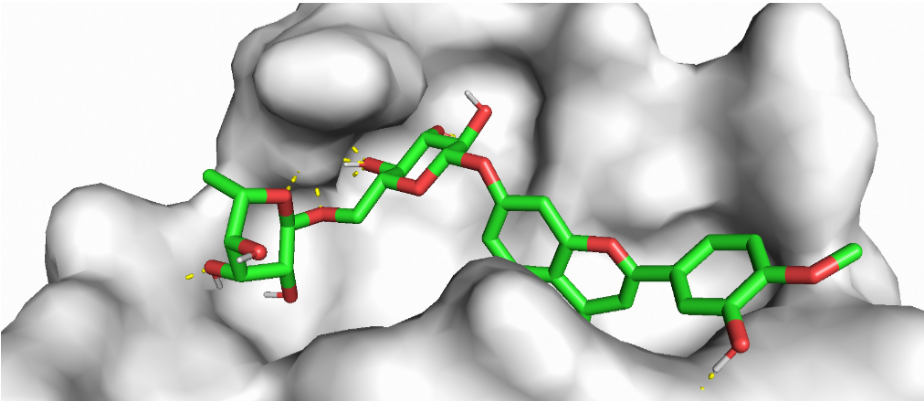
Putative best pose of diosmin docked at the active inhibitory site of 3CLpro. 9 hydrogen bonds can be seen by dashed yellow lines.
Putative best poses of the top 30 drugs evaluated in the docked position at the active inhibitory site of 3CLpro.
Putative best poses of the top 30 antiviral drugs evaluated in the docked position at the active inhibitory site of 3CLpro.
Table below lists predicted toxicological and ADME endpoints for the top 30 drugs.
Image of diosmin docked with the active site of 3CLpro of SARS-CoV-2.

